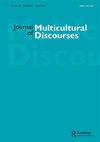Multilingual language policy discourses and superdiversity at the peripheries: exploring language policy and practice in Eritrea
IF 1.6
Q3 COMMUNICATION
引用次数: 2
Abstract
ABSTRACT Based on critical perspectives where normative and essentialist perceptions of language and ethnicity in policy discourses are challenged, and where the lack of attention to forms of social uses of language are highlighted, this paper discusses the limitations of even the most progressive pluralist language policy to capture the cultural and linguistic ‘diversification of diversity’ in Eritrea, a country in East Africa. The language policy in the country embraces all the languages of the country and promotes their use in education, mass media, provision of legal services, etc. Policy documents mention the equality of the nine languages. However, the presumed number of languages and, to some extent, their naming reflect a persistent colonial and missionary legacy, echoing the argument of some sociolinguists that languages in Africa are the creation of colonialists or missionaries. Based on insights from recent sociolinguistic and ethnographic studies on diversity, language and language use, this paper problematizes the notion of language, the naming of languages and their enumeration to highlight the limits of multilingual policy discourses to capture the superdiversity in countries of the global south, even within pluralistic language policy contexts such as the one in Eritrea.多语语言政策话语与边缘地区的超多样性——探索厄立特里亚的语言政策与实践
摘要基于批判性视角,政策话语中对语言和种族的规范和本质主义认知受到挑战,对语言的社会使用形式缺乏关注,本文讨论了即使是最进步的多元语言政策在东非国家厄立特里亚捕捉文化和语言多样性的局限性。该国的语言政策涵盖了该国的所有语言,并促进在教育、大众媒体、提供法律服务等方面使用这些语言。政策文件提到了九种语言的平等。然而,假定的语言数量,以及在某种程度上,它们的命名反映了持续的殖民主义和传教士遗产,呼应了一些社会语言学家的论点,即非洲的语言是殖民者或传教士创造的。基于最近对多样性、语言和语言使用的社会语言学和人种学研究的见解,本文对语言的概念、语言的命名及其列举进行了问题化,以强调多语言政策话语的局限性,从而捕捉到全球南部国家的超多样性,甚至在诸如厄立特里亚的多元语言政策背景下也是如此。
本文章由计算机程序翻译,如有差异,请以英文原文为准。
求助全文
约1分钟内获得全文
求助全文

 求助内容:
求助内容: 应助结果提醒方式:
应助结果提醒方式:


